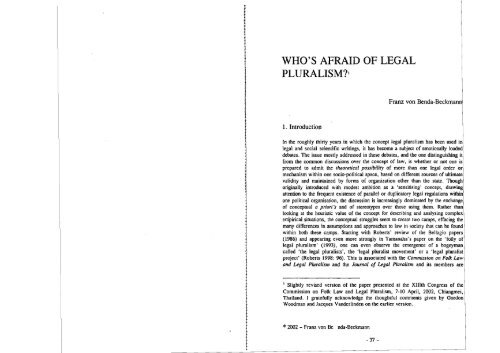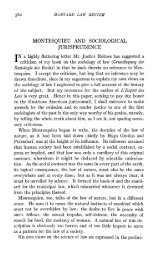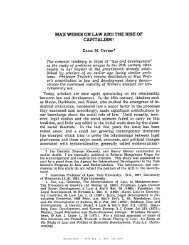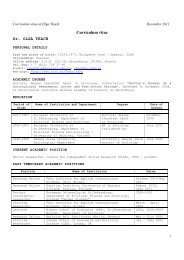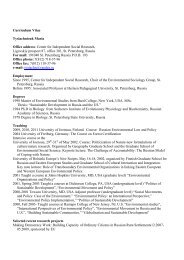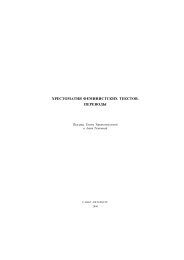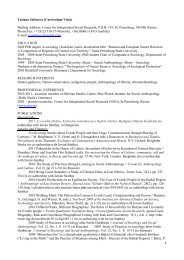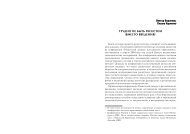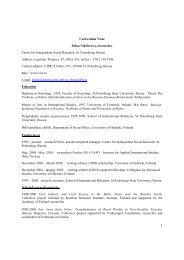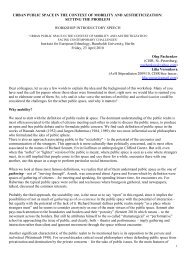WHO'S AFRAID OF LEGALPLURALISM?Itl. IntroductionFranz von Benda-Beckmannlo the roughly lhirty years in which lhe concepl <strong>legal</strong> <strong>pluralism</strong> has beeo used in<strong>legal</strong> and social scientific writings, il has become a subject <strong>of</strong> emotionally loadeddebales. The issue mostly addressed in lhese debales, and lhe one dislioguishing ilfrom lhe common discussions over the concepl <strong>of</strong> law, is whether or nol one isprepared to admil lhe theoretical possibility <strong>of</strong> more than one <strong>legal</strong> order ormechanism wilhin one socio-political space, based on differenl sources <strong>of</strong> ultimatevalidity and maintained by forms <strong>of</strong> organization other Ihan the state. Thoughoriginally introduced Wilh modesl ambition as a 'sensitising' concept, drawingattention to the frequent exislence <strong>of</strong> parallel or duplicalory <strong>legal</strong> regulations withinone political organisation, the discussion is increasingly dominaled by the exchange<strong>of</strong> conceptual a priori 's and <strong>of</strong> stereotypes over those using them. Rather thanlooking at the heuristic value <strong>of</strong> the concept for describing and analysing complexempirical situations, the conceplual slruggles seem lO create two camps, effacing lhemany differences in assumptions and approaches to law in society lhal can be foundwithin both these camps. Starting with Roberls' review <strong>of</strong> the Bellagio papers(1986) and appearing even more slrongly in Tamanaha's paper on lhe 'folly <strong>of</strong><strong>legal</strong> <strong>pluralism</strong>' (1993), one can even observe the emergence <strong>of</strong> a bogeymancalled 'the <strong>legal</strong> pluralists', the '<strong>legal</strong> pluralist movement' or a '<strong>legal</strong> pluralislproject' (Roberts 1998: 96). This is associaled with the Commission on Folk úiwami Legal Pluralism and the Journal o/ Legal Pluralism and ilS members areI Slightly revised version<strong>of</strong> lhe paper presented al the XlIIlh Congress <strong>of</strong> theCommission on Folk Law and Legal Pluralism, 7-10 April, 2002, Chiangmei,Thailand. I gratefully aclcnowledge the thoughtful comments given by GordonWoodman and Jacques Vanderlinden on the earlier version.1
WHO'S AFRAID OF LEGAL PLURALlSM?JOURNAL OF LEGAL PLURALlSMFranz von Benda-Beckmann 2002 - nr. 47accused <strong>of</strong> engaging in sorne ill-conceived enterprise <strong>of</strong> irresponsibly broadeningthe concept <strong>of</strong> law and equalising normative orders that are fJ¡ndamentallydifferent. It is argued that ca11ing normative orders other than state law, or notrecognised as law by the state, nevertheless 'Iaw', is ethnocentric and obscures thefundamental differences in form, structure and effective sanctioning between statelaw and other normative orders (see Tamanaha 1993; Roberts 1998; Yon Trotha2000).In my paper 1 want to continue the ongoing discussions. (See Yanderlinden 1971,1989, 1998; Fitzpatrick 1983; J. Griffiths 1986; Moore 1978a; Merry 1988; F.von Benda-Beckmann 1983, 1988, 1994, 1997; De Sousa Santos 1987; C. Fuller1994; Woodman 1998; Roberts 1998; Tamanaha 1993, 2000, 2001; K. vonBenda-Beckmann 200 la, b; A. Griffiths 2002.) 1 shall analyse the reasons givenfor and against the concept <strong>legal</strong> <strong>pluralism</strong> and clarify my own views on its valueand limitation, building on earlier ideas (F. von Benda-Beckmann 1979, 1983,1986, 1988,1992a,b,c; 1994, 1997, 2001a). In my view, the discussions are toostrongly fixated on the law-state link and give too liule aUention to other aspects<strong>of</strong> the definition <strong>of</strong> law that are equally importam. There is insufficient attention. to the question <strong>of</strong> the kind <strong>of</strong> concepl one tries to develop or use, and for whatreason, and what one understands as 'analytical' concepts. I shall therefore discussthese issues before I review the arguments for and against the state-law linkage. Inconclusion I shall come back to the division <strong>of</strong> <strong>legal</strong> and social scientists into apluralist on non-pluralist camp and show how liule usefui such division is.2. Preliminary questionsWe a1l know that in most societies, and probably in aH contemporary societies,there is a great complexily <strong>of</strong> cognitive and normative conceptions. Theseconstilute forms <strong>of</strong> Jegitimate social, economic and political power andorganisation and provide standards for permissible action and for the validity <strong>of</strong>Iransactions, as well as ideas and procedures for dealing with probJematicsituations, notably lhe management <strong>of</strong> conflict and disputes. Such multiplicity <strong>of</strong>conceptions may exlend 10 claims to give meaning and regulate a whole socialuniverse; they may also be limited to specific social domains such as marriage orproperty transactions or even more Iimited rule complexes. They may claim to,and may actually operate in socio-polítical and geographical spaces oC differentsize, within the boundaries <strong>of</strong> nation states, in infra-statal social fields or intransnational ones (Merey 1992; K. von Benda-Beckmann 2001; A. Griffiths2002). We also know that in many parts <strong>of</strong> the world, such complex situationsantedate the establishment oC a colonial or modern state, as does for instance theco-exislence <strong>of</strong> religious and non-religious conceptions in Indonesia. While social- 38 ¡¡tfand <strong>legal</strong> scientists' perceptions <strong>of</strong> such complexity and its implications for furtherconceptual, methodological and theoretical ideas vary significantly, we do nothave lO prove 10 anyone that it is lhere. The question is: How do we get to gripswith this complexity? With which categories and concepts can we make sense <strong>of</strong>it, conceptually and theoretically? This raises four major sets <strong>of</strong> questions.1) How far can we get with the concept <strong>of</strong> law? Which criteria should givesocial phenomena the quality <strong>of</strong> being '<strong>legal</strong>', and how do we distinguishsuch <strong>legal</strong> phenomena from other, non-<strong>legal</strong> ones?2) How do we deal with difference? Since the coricept <strong>of</strong> law, howevernarrowly or broadly defined, will have to encompass sorne varialÍon <strong>of</strong>social phenomena, how do we indicate the sets <strong>of</strong> criteria in which thesephenomena vary?3) What type <strong>of</strong> <strong>legal</strong> complexity do we call <strong>legal</strong> '<strong>pluralism</strong>'? Does thisconcept, or other frequently used terms Iike 'multiplicity' or 'plurality',suffice for dealing with the complexity we are confronted with? Does<strong>legal</strong> <strong>pluralism</strong> require the existence <strong>of</strong> more than one <strong>legal</strong> system ororder, or are '<strong>legal</strong> mechanisms' sufficient, and can one speak <strong>of</strong> <strong>legal</strong><strong>pluralism</strong> within one <strong>legal</strong> order? (see Woodman 1998).4) And, perhaps the most important yet leasl discussed question: what does'existence' or 'co-existence' oC law or <strong>legal</strong> orders mean (F. von BendaBeckmann 1979, 2001)?These questions are important. But 1 would likc to point out right from thebeginning thal whatever our answers will be, their reach will be limitect'. Whileour conceptual choices concerning law and <strong>legal</strong> <strong>pluralism</strong> are based on a number<strong>of</strong> methodological and theoretical assumptions, these must be supplemenled by amore encompassing social theoretical understanding <strong>of</strong> the social world. Theconcepts <strong>of</strong> 'Iaw' or '<strong>legal</strong> <strong>pluralism</strong>' are only a part <strong>of</strong> our wíder conceptual andanalytical tools. Neither will these concepts alone fully adequately capture ourresearch interests. I mention these self-evident points here because manyconceptual discllssions are carried out as if these single concepts stood for thewhole <strong>of</strong> theoretical understanding or research interes\.Approaching the conceptual issueThere is another preliminary point I would like to emphasise. Words and conceptshave no c1aims to an ínherent truth. They must be measured against theirambitions and evaluated ror their usefulness for the enterprise actors are engagedin. I shall therefore briefly c1arify my own position and reasons for choosing my- 39


